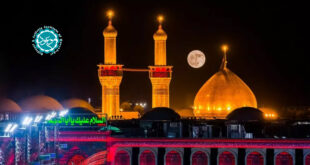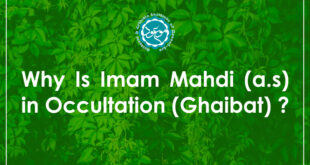Emam al-Rida (A.S.) defines for us the Islamic theory as the rules which govern the actual dealings of man with his brother man from which we can achieve the inspiration that Islam abolishes the then class distinctions among individuals and groups in the areas of public rights and the safeguarding of man’s dignity, and that the difference which we must recognize regarding these areas is the difference between one who obeys God and one who does not.
A man once said to the Emam: “By God! There is nobody on the face of earth who is more honourable than your forefathers.” The Emam responded by saying: “Their piety secured their honour, and their obedience of God made them fortunate.”30
Another man said to him: “By God! You are the best of all people!” He said to him: “Do not swear so. Better than me is one who is more obedient to God and more pious. By God! The following verse was never abrogated: `And We have made you nations and tribes so that you may know each other; verily the best of you in God’s sight is the most pious.'”31
Abul-Salt once asked him: “O son of the Messenger of God! What do you say about something people have been criticizing you for?” He asked: “What is it?” He said: “They claim that you call people your slaves.” He said: “God! Creator of the heavens and the earth, Knower of the hidden and the manifest! I invoke Thee to testify that I have never said so, nor did I ever hear that any of my forefathers had said so! God! You are the Knower of the many injustices this nation has committed against us, and this is just one of them…” Then he came to Abul-Salt and said: “O Abdul-Salam! If all people, as some claim, are our slaves, who did we buy them from?” Abul-Salt answered: “You are right, O son of the Messenger of God…” Then the Emam said: “O Abdul-Salam! Do you deny the right which God has allotted for us to be charged with the authority as others deny?” He said: “God forbid! I do acknowledge such right.”32
The Emam here denies such an allegation about him and his forefathers and rejects the vicious accusation which their enemies use against him to tarnish his image, considering it one of the many injustices committed against the Ahl al-Bayt (A.S.). Rather, he and the Household of the Prophet (S.A.W.) consider people to be equal in their general obligations except in the right of government which God ordained to be theirs solely, for others have no right to claim it for themselves. With the exception of the right to obey God in its most pristine implications which raised their status in the sight of God and man, all are the slaves of God. They share the same parents and worship the same God.
Abdullah ibn al-Salt quotes a man from Balkh saying: “I accompanied al-Rida (A.S.) during his trip to Khurasan. One day he ordered preparations for his meal to which he invited all his attendants, blacks and non-blacks, so I said: `May my life be sacrificed for yours! Maybe these should have a separate eating arrangement.’ He said: `God Almighty is One; the father (Adam) and the mother (Eve) are the same, and people are rewarded according to their deeds.'”33
The Emam does not see any difference between him and his servants and attendants except in the degree of good deeds; other than that, all distinctions are void when the matter is related to common obligations in which all individuals are equal, for each one of them is created by the same God, and each has the same father, Adam, who was created of dust.
When we see the Emam sitting at the table surrounded by his servants, his doorman, and his groom, he is thus teaching the nation a lesson in virtuous humanity which believes in the dignity of man in order to demonstrate the theory of Islam in practice showing the nature of behaviour man should undertake in his conduct towards his brother man. The loftiness of status and the elevation of career must not necessitate that a man of a less status or one whose career is less coveted should be despised or made to feel inferior to his brother man even if he is a servant. This is so in order to eliminate the complex class distinctions which widen the gap between the members of the society whose energies would then be split into opposing parties torn by grudge and consumed by hatred.
Islam enacted the law of equality among the members of the society in the areas of general obligations in order to emancipate man’s dignity from class obligations which dominated the way of life during the pre-Islamic era and were adopted by nations of old. God Almighty has said: “The best of you in the eyes of God is the one who is most pious.”34 The Prophet (S.A.W.) said: “All of you descended from Adam, and Adam was created of dust.” He also said: “No Arab can be held superior to a non-Arab except through superiority of his degree of piety.”
Ibrahim ibn al-Abbas al-Suli is quoted saying: “I heard Ali ibn Mousa al-Rida saying, `I swear by emancipation–and whenever I swore by it, I would emancipate one of my slaves till I emancipated each and every one of them–that I do not see myself as better than that (and he pointed to a black slave of his who remained in his service) on account of my kinship to the Messenger of God (S.A.W.) except if I do a good deed which would render me better.'”35
Thus does the Emam define for us the good Islamic conduct of safeguarding the dignity of man and the elimination of all class distinctions except the distinction of good deeds. He, peace be upon him, does not view his kinship to the Prophet (S.A.W.) as providing him with a distinction over a black slave except if such kinship is combined with good deeds which render the doer distinction and superiority. Yasir, one of his servants, said once: “Abul-Hasan said to us once: `If I leave the table before you do, while you are still eating, do not leave on my account till you are through.’ It may happen that he calls upon some of us to his service and he is told that they are eating, whereupon he says: `Leave them to finish their meal first.'” Nadir, another servant, says: “Abul-Hassan did not require us to do anything for him except if we had finished eating our meal.”36
These are samples of his actual conduct and humanity which he inherited as a fragrant legacy the perfume of which is goodness and mercy from his grandfather the greatest Prophet (S.A.W.) who crowned his message with the banner of good conduct when he said: “I have been sent to perfect the code of good conduct.” Such was that genuine humane legacy from whose spirit nations derive their strength and upon which they build the pillars of their glory and through which they secure the continuation of their very existence.
His Conduct Regarding His Appearance
There is no doubt that, generally speaking, the Emams (A.S.) were more distant than anyone else from the alluring wares of this vanishing world, and most distant from its ornamentations and allurements. But the concept of asceticism according to them was not limited to wearing modest coarse clothes or eating very simple food. Rather, its limits extended beyond that, for the ascetic person is the one who does not allow the pleasures of this world to take control over him without being able to take control of them, one who does not see this world as the ultimate goal he seeks; rather, when it comes towards him, the believer is entitled to enjoy its good things, and when it forsakes him, he contends himself that God’s rewards are more lasting.
Al-Aabi is quoted in Nathr al-Durar as saying:
“A group of sufis visited al-Rida (A.S.) when he was in Khurasan, and they said to him, `The commander of the faithful looked into the authority God Almighty entrusted to him, and he found you, members of the Prophet’s Ahl al-Bayt (A.S.), to be the most deserving of all people to be the leaders. Then he discerned you, members of the Prophet’s Ahl al-Bayt (A.S.), and he found yourself the most worthy of leading the people, so he decided to entrust such leadership to you. The nation is in need of one who wears coarse clothes, eats the most simple food, rides the donkey and visits the sick.’ Al-Rida (A.S.) was first leaning, then he adjusted the way he was sitting and said: `Joseph (Yousuf) was a Prophet who used to wear silk mantles brocaded with gold. He sat on the thrones of the Pharaohs and ruled. An Emam is required to be just and fair; when he says something, he says the truth, and when he passes a judgement, he judges equitably, and when he promises something, he fulfills his promise. God did not forbid (an Emam) from wearing a particular type of clothes or eating a particular type of food.’ Then he recited the Qur’anic verse: `Say: Who has forbidden the beautiful (gifts) of God which He has produced for His servants, and the good things, clean and pure (which He has provided) for sustenance?'”37
Emam al-Jawad (A.S.) was asked once about his view regarding musk. He answered: “My father ordered musk to be made for him in a ben tree in the amount of seven hundred dirhams. Al-Fadl ibn Sahl wrote him saying that people criticized him for that. He wrote back: `O Fadl! Have you not come to know that Joseph (Yousuf), who was a Prophet, used to wear silk clothes brocaded with gold, and that he used to sit on gilded thrones, and that all of that did not decrease any of his wisdom?’ Then he ordered a galia moschata (perfume of musk and ambergris) to be made for him in the amount of four thousand dirhams.'”38
Thus does the Emam prove that the outward appearance of asceticism has nothing to do with true asceticism; rather, it may even be a fake whereby someone tries to attract the attention of others. This is why Emam al-Rida (A.S.) and other Emams did not see anything wrong with meeting the public with an appearance of luxury in what they put on or ate as long as it did not collide with the reality of asceticism which is the building of the self from within to renounce the world and its allurement and regard it as a vanishing display with a short span of life. This does not forbid the believer from enjoying its pleasures in the way which God made permissible. God did not create the good things in this world for the disbeliever to enjoy while depriving the believers therefrom. Rather, God considers the believer to be more worthy of such enjoyment when he submits himself to God and expends it in His Path.
 Mouood Mouood English Edition
Mouood Mouood English Edition




